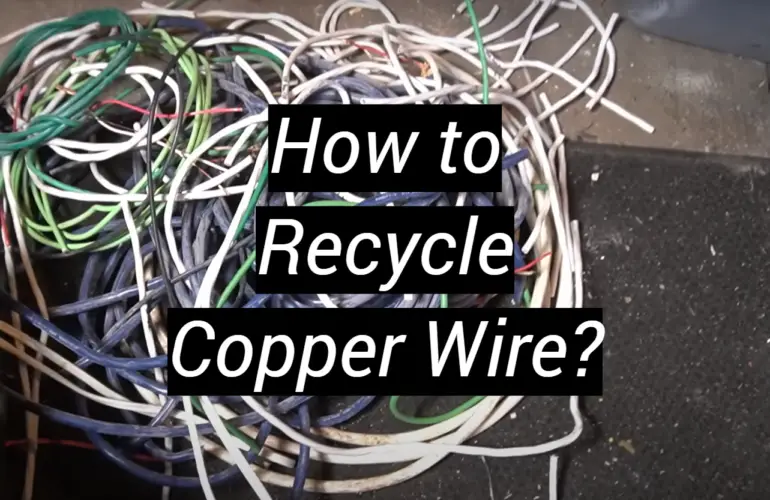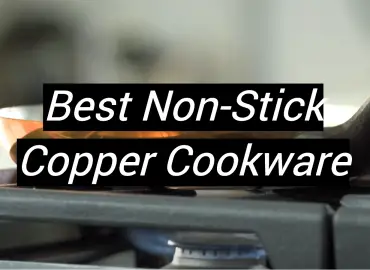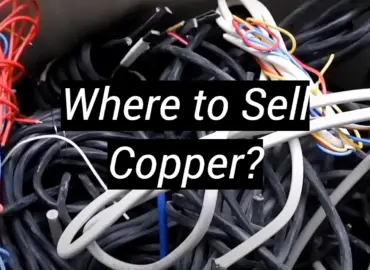Recycling copper wire is a crucial step to conserve resources and reduce waste. It also creates economic opportunities from scrap copper that might otherwise be thrown away. With the right tools and knowledge, this process can be flawless and will help preserve our environment. So, if you’re seeking a strategy to protect natural resources, keep reading to find out how copper wire is recycled.
Can you reuse copper wires?
Yes, copper wires are reusable.
Reusing this metal helps lessen the need for new copper mines. Its reuse allows to reduce energy consumption since one needs much less energy to process recycled copper compared to creating new copper from raw materials. It helps lessen pollution because mining for new copper ore requires extensive use of natural resources such as water and chemicals.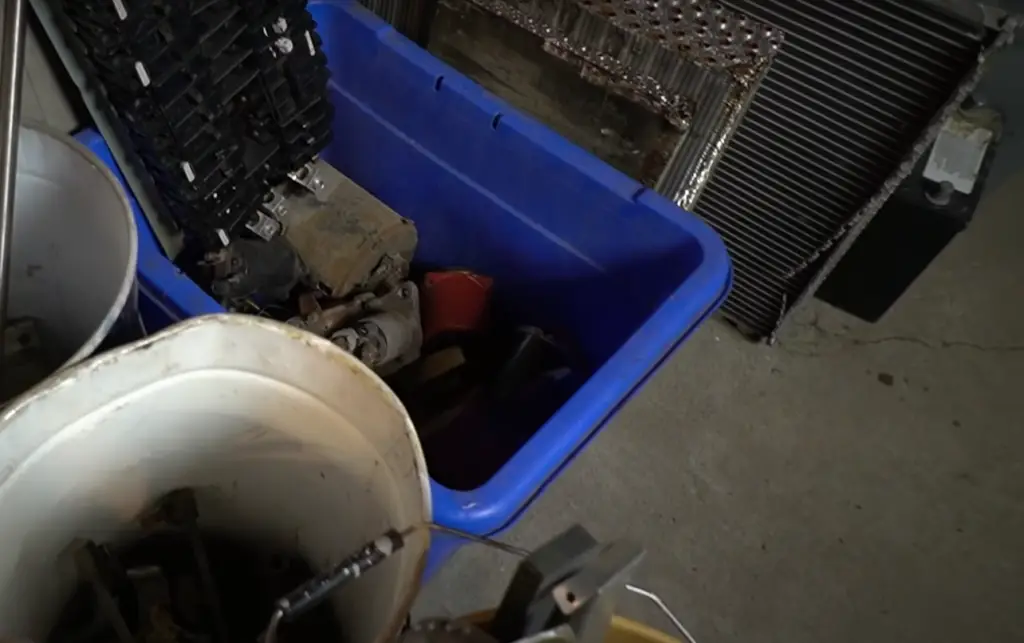
Furthermore, recycled copper can be used in a variety of products ranging from jewelry and electronics to plumbing fixtures and construction materials. Reusing scrap copper provides economic benefits by increasing supply and reducing the cost of manufacturing.
What is copper wire recycling?
The process of breaking down scrap copper wires into smaller bits to be utilized in the manufacturing of new products is known as “copper wire recycling.” Copper has long been one of the most important materials used in electrical wiring and electronics. So, it’s no surprise that there’s such an emphasis on recycling this particular material.
Recycling of this metal helps reduce environmental pollution and conserve resources, and helps create economic opportunities by creating more raw materials for manufacturing and construction. By using copper wire recycling services, you can ensure your portion of the world is attempting to use less energy and emit fewer pollutants. So, if you want to make sure that your community is doing its part in helping protect our environment [1].
The pros of copper wire recycling
Here are a few of the advantages of reusing copper wire:
- It guards the environment and the health of the community: Collecting wire made of copper not only eliminates pollution but also helps preserve your community’s health by limiting exposure to dangerous substances;
- Reduction of CO2 emissions and consumption of energy: Reusing copper cables reduces emissions and use of electricity, which helps to decrease global warming [2];
- Create a reputation as a sustainable business: Taking steps to recycle scrap copper will improve your company’s reputation as an environmentally friendly business and create long-term customer loyalty;
- Remove the debris from your job location: By using recycling services related to copper wires, you can help keep job sites clean and free from hazardous waste;
- Earn money by selling your scrap wire: Selling scrap copper can be a great way to supplement your income and help support your business. It’s also an easy process with many companies offering convenient pickup services;
- Create jobs in your local area: By recycling this metal, you help create jobs in your local area which is good for the economy and helps people find employment opportunities;
- Reduce mining of natural resources: It reduces the need to mine resources which helps preserve our planet’s natural beauty and wildlife habitats while also reducing energy consumption [3];
- Use fewer packaging materials: Reusing copper wire helps reduce the need for new packaging materials which can be good for the environment and your pocketbook;
- Contribute to a greener future: Recycling wires made of copper helps ensure that our planet remains green and healthy for future generations;
- Support your local economy: Recycling copper wire helps support local businesses and encourages economic growth in your community. It’s a win-win situation.
Which copper wires can be recycled?
The following are the most commonly recycled copper wire types:
Bare bright copper wire
It has been stripped of its insulation and is usually found in electrical wiring.
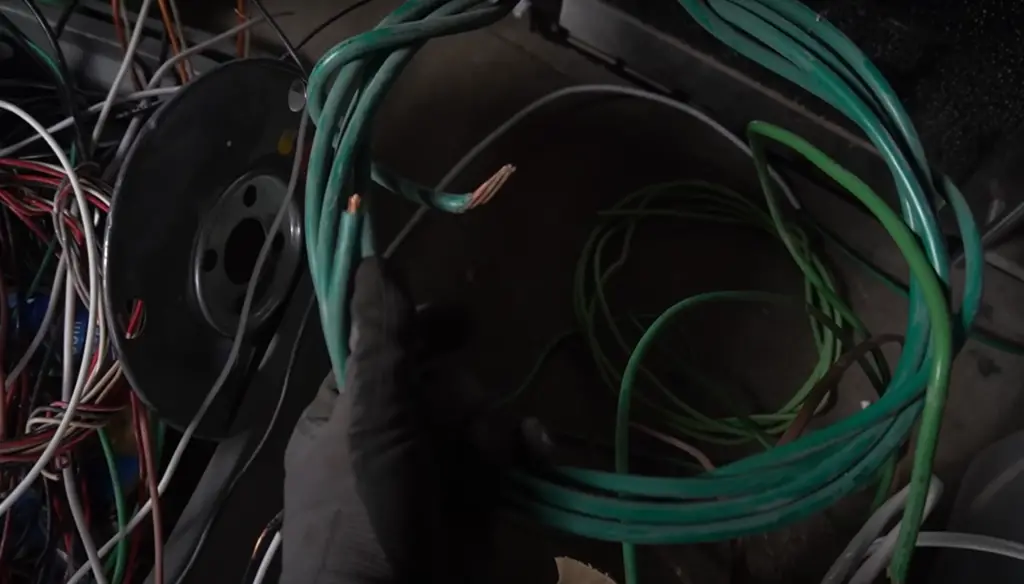
It is the most valued sort of wire made of copper that is easily recyclable.
Light gauge insulated wires
These are small-diameter insulated wires that often come from electronic devices or appliances. They have a thin layer of insulation covering them and can be recycled for scrap value.
Heavy gauge insulated wires
These thicker insulated wires are usually used in large-scale construction projects such as buildings, bridges, and roads. These typically have more insulation on them which adds to their scrap value when they are recycled.
Coaxial cables
Although these types of cables contain aluminum rather than copper, they are considered a sort of wire made of copper as aluminum is often insulated with copper. Coaxial cables can be recycled for their scrap value.
Computer and communication wires
This sort of wire typically contains plastic and copper insulation, which must be removed before it may be recycled. Although it has poor scrap values, it nevertheless delivers some economic benefit when recycled.
Industrial wires and cables
These types of wires are usually used in industrial settings such as factories, power plants, and mines. They have higher scrap value than other types of wire made of copper due to their size and composition.
Automotive wiring
Plastic and metal components in automotive wiring must be sorted before they can be repurposed.
Power cables
These thick cables are often used in power plants and electrical grid systems and usually contain a mix of copper and aluminum.
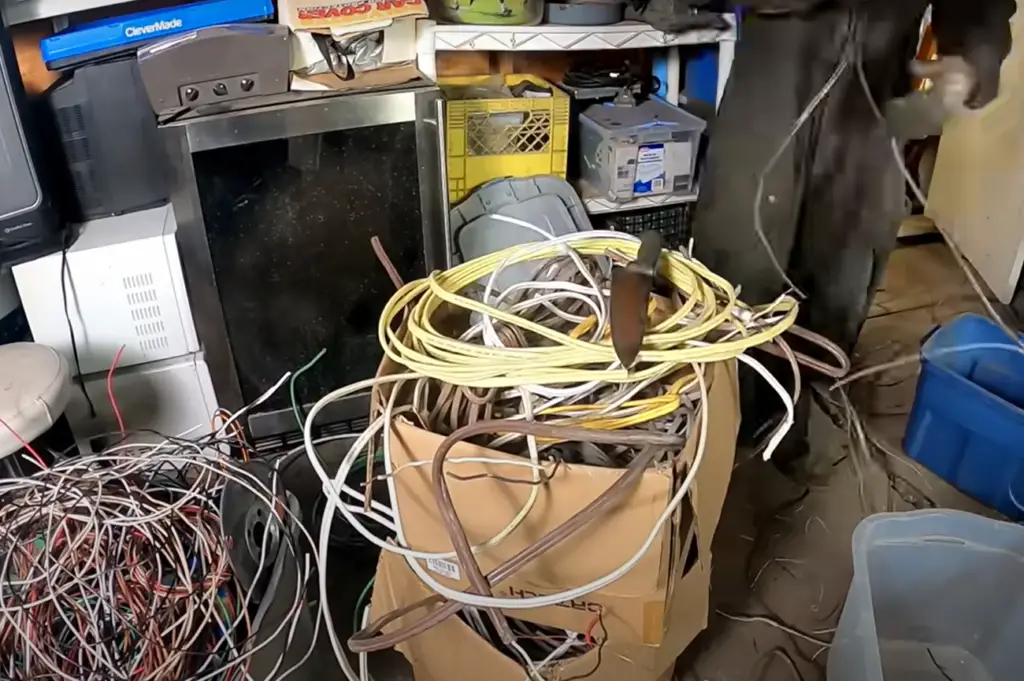
They have high scrap values when recycled due to their large size and composition.
Networking cables
These types of wires contain plastic and metal components that need to be separated before they can be recycled. It typically has low scrap values but still provides some economic benefit when it is recycled.
Fiber optic cable
This type of wire contains glass fibers that are wrapped in a protective sheath made of either plastic or metal materials. It has low scrap value but can still provide some return when it is properly recycled.
Where can I recycle copper wire?
There are a few options for recycling copper wire:
- Local recycling centers: Many cities and municipalities offer a local recycling center that accepts junk wire made of copper for a modest fee;
- Specialized recycling facilities: These types of facilities are typically geared towards industrial or commercial customers and can provide higher returns for your copper wire due to their specialized equipment;
- Reclamation yards: You may be able to locate reclamation yards that will accept your old wire of copper for free. However, before selling your scrap materials, verify local legislation to ensure you are obeying all restrictions;
- Online reclamation services: Many online reclamation services will buy your scrap copper wire for a fee. Be sure to do research before selling your materials to ensure you get the best deal and avoid scams;
- Copper wire recyclers: You may be able to find a specialized copper wire recycler in your area. These types of services usually charge a fee for their recycling services but can give you higher returns for your materials.
How do I prepare the copper wire for recycling?
You may easily recycle your copper wire and obtain a return on your investment if you follow these procedures [4]:
Step 1. Collect the copper wire
It is the first step in preparing your copper wire for recycling. Make a point of gathering all of the wires and cables that need to be recycled in one location so that they can be easily transported.
Step 2. Separate the wires
To get the best scrap value, you should separate plastic or aluminum components from the copper wire before recycling. You can do it by hand or with specialized equipment depending on how much material you have.
Step 3. Clean the wire
After separating non-copper materials from your copper wire, you should clean them to remove dirt, grease, and other contaminants before sending them off for recycling.
Step 4. Bundle the wire
Once you’ve collected and cleaned the copper wire, bundle them together to make them easier to transport. You can use a cable binder or other strapping material for this step.
Step 5. Transport the wire
After bundling your copper wire, it’s time to transport them to your local recycling center or scrap metal recycler. Check with your local regulations before transferring items, as certain states have restrictions on how scrap materials can be carried.
Step 6. Collect payment
If you are selling your scrap copper wire, many recyclers will provide you with payment upon delivery of the materials.
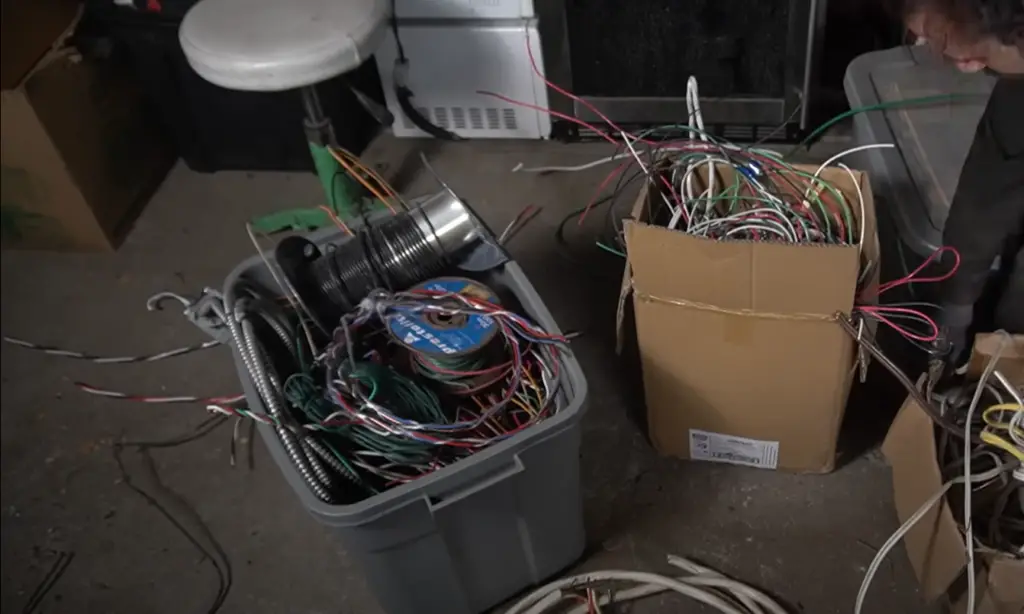
Be sure to ask about their payment policies beforehand so that there are no surprises when you arrive at the facility.
Step 7. Final disposal
After collecting payment, it’s time to dispose of your scrap copper wire. Make sure to follow all local laws and regulations when disposing of materials to remain compliant with environmental standards.
What is the best way to clean copper wire for recycling?
To clean copper cables for recycling, first remove the insulation with a knife or by boiling it [5]:
Stripping the wire with a knife
One of the easiest ways to strip insulation from the copper wire is with a sharp knife:
- Make sure you wear protective gloves and eye protection when using a knife as the process can be dangerous;
- Insert your knife under one end of the insulation and gently run it down until all of the insulation has been removed;
- Use your hands or pliers to pull off the remaining pieces of insulation that are still attached.
Boiling the wire
Boiling copper cables in water is another method for getting rid of insulation. This method can be used for insulated and uninsulated wire, but you should ensure to use caution when handling boiling water. Allow the copper wire to remain in a kettle of boiling water for a few minutes before carefully extracting it with tongs or pliers. The heat will cause the insulation to separate from the copper, making it easier to remove.
Cleaning remaining dirt or debris
Once the insulation has been removed from your copper wire, you should use a wire brush and some soapy water to clean off the remaining dirt or debris that may still be attached. Scrub the wire with the brush until all of the dirt has been removed.
FAQs
Should copper cables be stripped before recycling?
Yes, they should. It is best to strip copper wire before recycling it. It helps to separate plastic or aluminum components from copper wire, which can lead to higher scrap values and more efficient recycling processes.
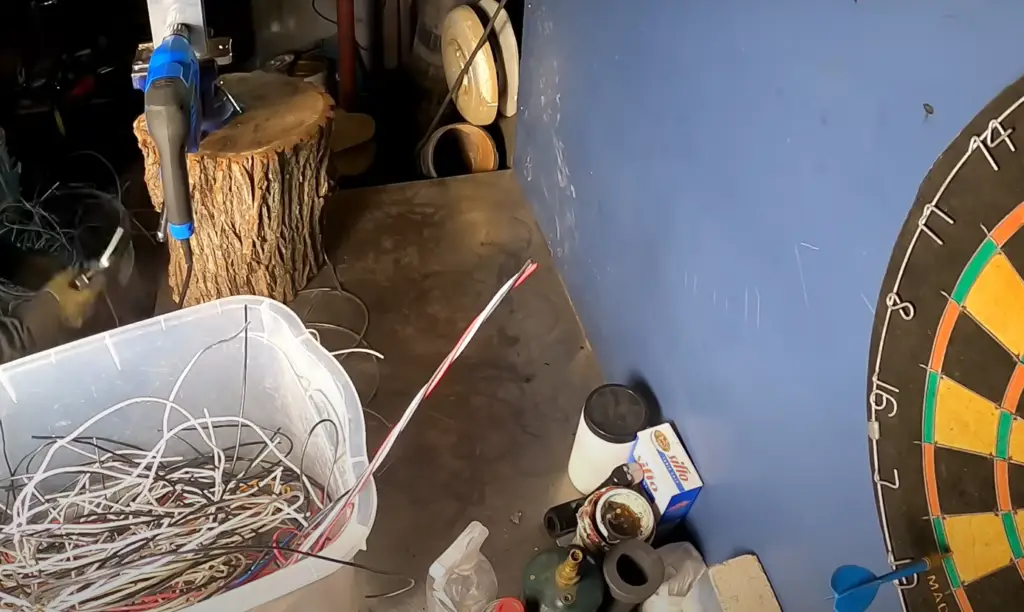
Cleaning the copper wire of dirt or debris will ensure the material is properly recycled without contaminants affecting its quality. Therefore, stripping and cleaning your copper wire before recycling is essential for economic and environmental reasons.
Can you burn copper wire to strip it?
Burning copper wire to strip it is not recommended. Burning exposed copper wires can release harmful toxins into the air, which can be hazardous to your health and damaging to the environment. It is also not an efficient way of removing insulation as it is difficult to control the heat and may end up damaging the copper itself. It is best to use a knife or boiling water when removing insulation from copper wire [6].
Why does copper wire turn black?
Copper may oxidize and turn black when heated. When oxygen molecules in the air react with copper, a patina forms on its surface. The patina helps to protect the copper from corrosion by forming an additional layer of protection. This reaction does not affect the integrity of the copper wire or its electrical properties. It only gives the copper a dark color that will eventually fade away.
What are some common uses for recycled copper wire?
Recycled copper wire has many practical applications in commercial and industrial settings, including manufacturing electrical components, wiring circuitry, creating connectors, and making tools.
Recycled copper wire can be used to create decorative jewelry pieces and accessories.What cleans copper wire the best?
Wire brushes are the best tool for cleaning copper wire because they effectively remove dirt and debris from the material surface. Pliers can also be used to grab hold of stubborn pieces of insulation or debris that may remain attached after boiling or stripping. Using a knife is one of the most popular methods for removing insulation from copper wire, as it requires minimal effort and provides control over where you want to strip the insulation.
What cleans copper wires the fastest?
Boiling the copper in water is one of the fastest ways to clean it. Boiling removes insulation from the copper wire and can be done with insulated and uninsulated wires.
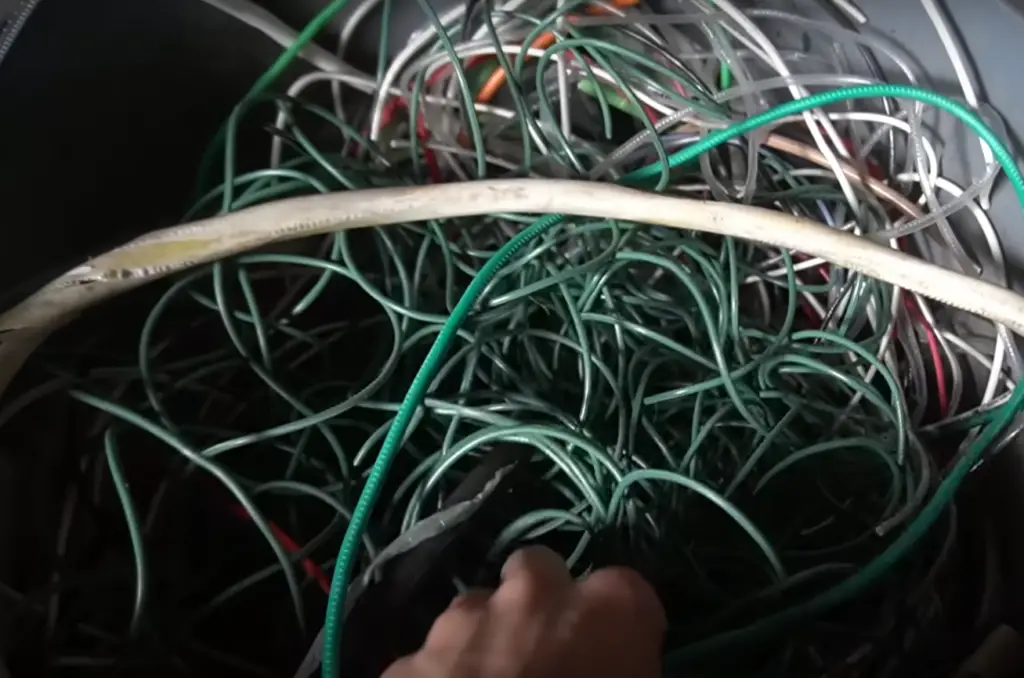
Boiling will help to remove dirt and grease that may remain attached after stripping or brushing. This method can be dangerous. So, wear protective gloves and eye protection when handling hot materials [7].
How do you reuse old wires?
Old wires can be reused in a variety of ways. One of them is to create decorative pieces of jewelry or other accessories with copper wire. Copper wire is very malleable and corrosion-resistant, making it ideal for creating curved shapes or intricate designs. Old wires can be used for electrical projects like wiring circuitry or creating connectors. You can also sell them to scrap metal recyclers as part of the recycling process.
Useful Video: How Much Do You Make Stripping Copper Wire In A Day?
Conclusion
Recycling copper wire is a great way to reduce waste and increase the sustainability of our planet. Properly preparing the copper wire for recycling by stripping, cleaning, and bundling it will ensure that it is recycled efficiently and effectively. Knowing the proper tools to use and methods to clean your copper wire will help you get the most out of your scrap metal when selling or recycling it. Understanding these steps are crucial to properly and efficiently recycling copper wire.
References:
- https://www.kristechwire.com/how-is-copper-wire-recycled/
- https://copperalliance.org/resource/copper-recycling/
- https://gretelbelle.com/the-environmental-impact-of-copper-mining-how-we-can-reduce-it/
- https://www.cjdecycling.com/recycling-copper-through-a-copper-recycler/
- https://www.wikihow.com/Clean-Copper-Wire/
- https://reviewonline.co.za/164317/burning-copper-wires-is-dangerous-for-several-reasons/
- https://www.instructables.com/How-to-perfectly-clean-wires-in-minutes/

